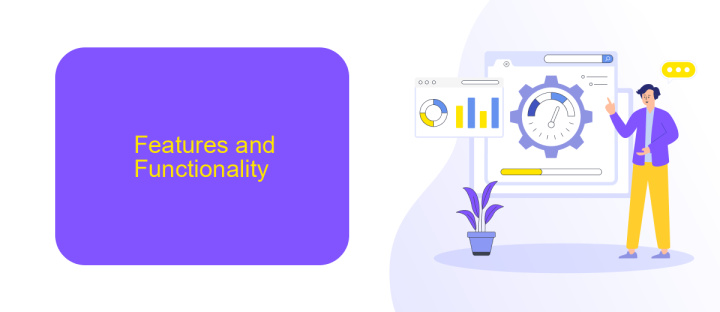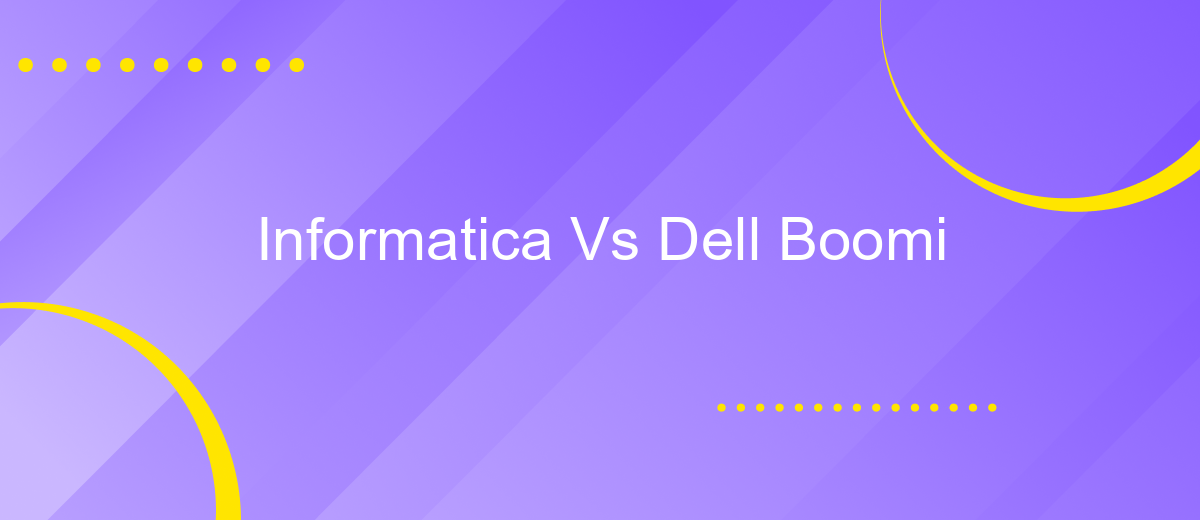Informatica Vs Dell Boomi
In the rapidly evolving landscape of data integration, Informatica and Dell Boomi stand out as two leading platforms, each offering unique strengths and capabilities. This article delves into a comparative analysis of Informatica and Dell Boomi, examining their features, performance, and suitability for various business needs. By the end, you'll have a clearer understanding of which platform might best serve your integration requirements.
Introduction
In today's rapidly evolving digital landscape, businesses require efficient and reliable integration platforms to streamline their operations and enhance productivity. Informatica and Dell Boomi are two leading solutions in this domain, offering comprehensive features for data integration, application integration, and API management. Each platform has its unique strengths, making it essential for organizations to understand their differences and choose the right tool for their specific needs.
- Informatica: Known for its robust data integration capabilities, extensive ETL functionalities, and advanced data governance features.
- Dell Boomi: Renowned for its ease of use, cloud-native architecture, and seamless integration with various applications and services.
- ApiX-Drive: A versatile service that simplifies the integration process, allowing businesses to connect multiple applications and automate workflows without extensive technical knowledge.
As companies increasingly rely on diverse software ecosystems, selecting the appropriate integration platform becomes crucial for maintaining operational efficiency. This article will delve into the key features, benefits, and use cases of Informatica and Dell Boomi, providing a comprehensive comparison to help businesses make an informed decision.
Features and Functionality

Informatica offers a comprehensive suite of data integration tools designed to handle complex data environments. Its features include robust ETL (Extract, Transform, Load) capabilities, data quality management, and master data management. Informatica also supports a wide range of data sources and formats, making it versatile for various business needs. The platform's advanced data governance and security features ensure that data is managed and protected effectively. Additionally, Informatica's AI-driven insights and automation capabilities help streamline data workflows and enhance decision-making processes.
Dell Boomi, on the other hand, is known for its ease of use and rapid deployment. It provides a cloud-native integration platform as a service (iPaaS) that enables users to connect applications, data, and devices seamlessly. Boomi's drag-and-drop interface simplifies the integration process, making it accessible even for non-technical users. The platform also offers real-time data integration, API management, and EDI support. For businesses looking to automate their integration processes further, services like ApiX-Drive can be integrated with Boomi to enhance functionality and streamline workflows, ensuring efficient and effective data management across the organization.
Pricing and Support

When it comes to pricing, Informatica and Dell Boomi offer flexible plans tailored to different business needs. Informatica typically follows a subscription-based model, which can be more cost-effective for larger enterprises with extensive data integration requirements. Dell Boomi, on the other hand, provides a tiered pricing structure that caters to both small businesses and large organizations, making it easier for companies to scale their operations as needed.
1. Informatica: Subscription-based pricing, ideal for large enterprises.
2. Dell Boomi: Tiered pricing, suitable for businesses of all sizes.
3. ApiX-Drive: Offers competitive pricing for seamless integration setup.
In terms of support, both Informatica and Dell Boomi offer comprehensive customer service, including 24/7 technical support, online resources, and community forums. Informatica provides dedicated account managers for personalized assistance, whereas Dell Boomi offers extensive documentation and training programs. Additionally, services like ApiX-Drive can further simplify the integration process by providing user-friendly tools and expert support, ensuring smooth and efficient deployment of integrations.
Use Cases and Success Stories

Informatica and Dell Boomi have proven to be invaluable tools in various industries, each demonstrating unique strengths in data integration and management. Informatica has been widely adopted by large enterprises for its robust data governance and extensive scalability. On the other hand, Dell Boomi is often favored by mid-sized companies for its user-friendly interface and rapid deployment capabilities.
One notable success story for Informatica involves a global financial institution that needed to integrate data from multiple sources to improve its customer analytics. By leveraging Informatica's advanced data integration capabilities, the institution achieved a unified view of customer data, leading to more personalized services and increased customer satisfaction.
- A healthcare provider streamlined patient data management using Dell Boomi, reducing data entry errors by 30%.
- A retail chain used Informatica to integrate sales data across various platforms, boosting inventory accuracy by 25%.
- ApiX-Drive facilitated seamless integration between CRM systems and marketing tools, enhancing lead conversion rates by 20%.
These examples highlight the versatility of Informatica and Dell Boomi in addressing diverse business needs. Whether it's through Informatica's comprehensive data governance or Dell Boomi's ease of use, organizations can achieve significant improvements in efficiency and data accuracy. ApiX-Drive further complements these platforms by simplifying the integration process, making it accessible for businesses of all sizes.
Conclusion
In conclusion, both Informatica and Dell Boomi offer robust solutions for data integration, each with its unique strengths. Informatica shines with its advanced data management capabilities and extensive on-premise solutions, making it ideal for large enterprises with complex data environments. On the other hand, Dell Boomi excels in cloud-native integrations, providing a user-friendly interface and rapid deployment, which is particularly beneficial for businesses looking to leverage cloud technologies for agility and scalability.
When choosing between the two, organizations must consider their specific needs, including the scale of integration, deployment preferences, and budget constraints. Additionally, services like ApiX-Drive can complement these platforms by offering seamless integration setups and automation, further enhancing the efficiency of data workflows. Ultimately, the right choice depends on aligning the platform's capabilities with the business's strategic goals and technological landscape.


FAQ
What are the main differences between Informatica and Dell Boomi?
Which platform is more cost-effective?
How do both platforms handle scalability?
Which platform offers better support for real-time data integration?
Are there third-party services to help implement and configure these platforms?
Do you want to achieve your goals in business, career and life faster and better? Do it with ApiX-Drive – a tool that will remove a significant part of the routine from workflows and free up additional time to achieve your goals. Test the capabilities of Apix-Drive for free – see for yourself the effectiveness of the tool.

